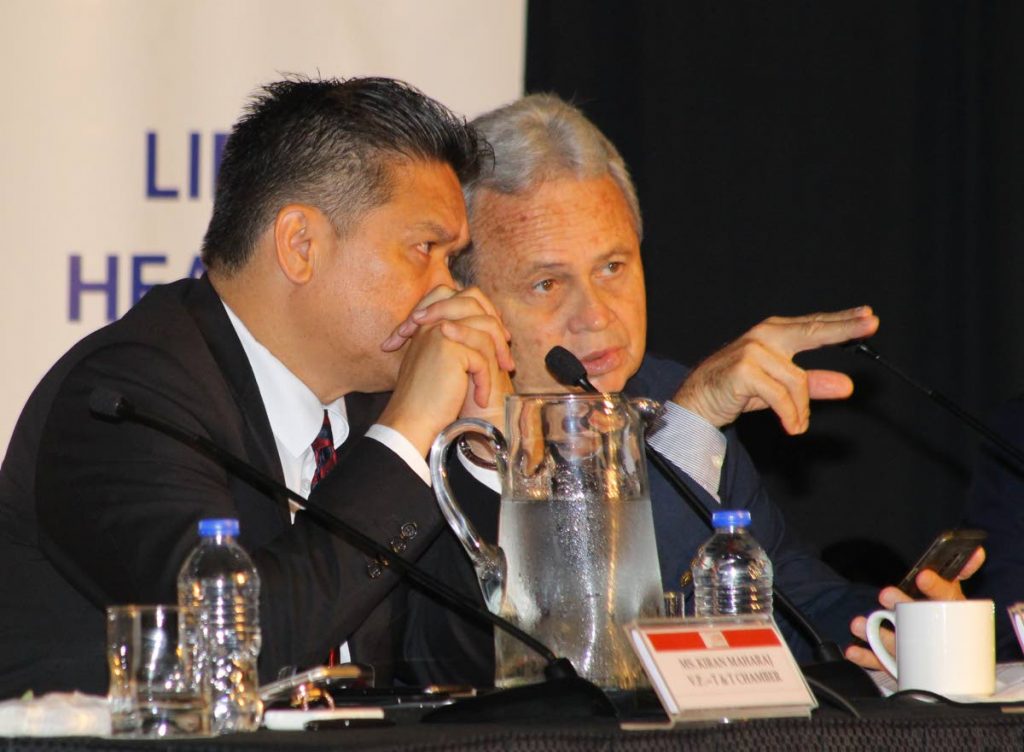NGC’s bright energy future

NATIONAL Gas Co president Mark Loquan welcomes the focus on energy efficiency which Government has placed in the 2019-2020 budget.
Given an increasing focus in the world on energy efficiency and renewable energy, Loquan says Government, and, by extension NGC – its natural gas operator – had to keep in step with the global movement.
“The whole focus on the budget where you are using certain prices for gas and also paying attention to energy efficiency, and those kinds of things, they make sense in that picture,” he shared with Business Day, after participating in the TT Chamber of Industry and Commerce’s post-budget meeting at the Hyatt Regency in Port of Spain on Tuesday.
Last year, the conversation was about renewable energy, not energy efficiency, Loquan recalled, and is pleased the conversation now addresses both, noting NGC is “very cognisant of the environmental and carbon emission side.”
In Monday’s budget, Finance Minister Colm Imbert detailed plans for an energy audit on state buildings and to encourage all high energy users in industries to set greenhouse gas emissions policies, including to improve natural gas efficiency.
NGC will do its part with an audit of its headquarters in Couva, said Loquan. However, as a member of Cabinet’s energy efficiency committee, its core focus remains on natural gas supply which remains the driver of the economy.
Recent years have had supply challenges, noted Loquan. “We would have gone through several years of shortages and curtailments,” he said.
In a recap of 2016, Loquan recalled that there were several gas supply contracts that had expired or were expiring. Around that time, the country’s gas supply had fallen to as low as 3.1 billion cubic feet (bcf) per day. But there was a turnaround, in subsequent years when there was “a rise in gas supply up to between 3.6 and 3.7 bcf per day” due to new agreements with the upstream providers, such as BPTT and Shell.
The negotiations were among the points he made during the post-budget meeting, where noted that even now negotiations are still ongoing but among downstream stakeholders.
As the state shareholder in Atlantic LNG, Loquan told business leaders discussions continue on the operations of Train 1, after concerns it be may mothballed due to a shortfall in the natural gas supply from BPTT/Shell. He said the focus is on more transparent pricing for Train 1. Overall, the global situation was that gas was being paid for at higher prices from this year. The $53 billion budget was based on an oil price of US$60 per barrel and a gas price of US$3 per mmbtu.
In other sectors, Loquan reported ammonia and methanol prices have come down substantially from 2013 and 2014 and have flattened. The forecast is for a slight rise but not to the levels of 2013-2015.

“So we can’t depend on petchem (petrochemical) prices and say that is going to rescue us in the future,” Loquan said at the forum.
The question was to diversify the business and move away from the model of just buying and selling gas and to get value for the people of TT, he said. One challenge is to keep all the plants that have been built up for decades sustainable. Downstream operators, he said, are in a state of turnaround and there must now be close coordination with upstream suppliers to maintain consistency in the gas supply.
“And there has been a lot more careful balancing of that act.” Loquan said in a higher priced gas market the thinking has changed towards a gas value chain that improves NGC’s operations and benefits its customers.
“So I think we are transforming ourselves and have been doing that by looking at our non-operating joint ventures and our portfolio there. We’ve been looking at marginal fields. We’ve brought on new skills in terms of geology…energy marketing and training. We never had that before,” he told business leaders.
Elaborating on the transformation plan, in the Business Day interview, Loquan said NGC remains optimistic of success in its regional and international ventures with countries such as Venezuela, Guyana and in Africa. He remained confident that TT will receive natural gas from Venezuela’s Dragon field. While no one knows when the political crisis in Venezuela will be resolved, Loquan said NGC continues to have talks with the players on the technical issues. He explained one just has to look at how much gas is in the Dragon field “and how near it is to the Hibiscus platform.”
With a term sheet and heads of agreement already in place for Dragon, Loquan said there were good commercial drivers on both sides which can create a win-win scenario, once the political situation is resolved. “They need to have the cash and we need to have the gas.” Loquan reiterated that obtaining gas from Dragon was “always a medium-term outlook.”
Through its subsidiary National Energy, Loquan said NGC will establish a presence in Guyana, which is on the cusp of an energy boom, by the end of this year. Further afield in Ghana, Loquan said details are being worked out to bring a total of 24 operators from the African country for training in TT. He also said NGC is looking at similar initiatives through a technical services agreement signed with Mozambique.
“For energy business we cannot have a vision of one year or five years. When you start to look at energy you start to see long term vision of where you want to be,” he said, emphasising, “Our model has looked at sustainability of the petchem sector.”
Loquan pointed out Chile has a roadmap to 2050 and its citizens are challenged everyone to be more efficient, adding the vision cannot be achieved without a level of collaboration and knowledge transfer.
“And wherever we are, whether its NGC or Heritage (formerly Petrotrin), there must be a focus on building the local talent of TT for the future. The evolution of the energy industry now means that you have to play a role across the value chain.”
As a player which is “strategically placed in a chain that deals with upstream, midstream, downstream, marketing and trading and so on,” Loquan said, “NGC sits in the centre of all of this” – playing different roles from shareholder to supplier.

“We see NGC playing a strategic role in this country because of the value that we contribute to the economy and the country. Everyone underestimates the role of NGC.”
Loquan said most people did not know “it’s the NGC who is actually keeping power stable and electricity and all the lights turned on.”
“It is NGC who is buffering all of the disturbances in the upstream and keeping a very stable supply to the downstream,” he said.
The importance of the NGC to the country’s energy business model was underscored by the Prime Minister and Energy Minister Franklin Khan at the signing of the Shell-NGC term sheet in June.
Dr Rowley said removing NGC from the model was akin to committing hara kiri (Japanese ritual suicide), while Khan declared, “Nobody is going to squeeze the NGC out of the gas value chain.”
In this regard, Loquan said, “I think there is no question of the value that the NGC plays.” But, he said, that value is not limited to NGC’s contribution to the economy. The company also contributes to the communities and people of TT. Loquan cited the Bocas Lit Fest and San Fest, as two examples of the company’s corporate social responsibility initiatives. This is a responsibility, Loquan holds dear to himself, as, in a concert at NAPA this weekend, he celebrates 20 years as a composer of steelpan music.
Facts about the NGC
Incorporated on: August 22, 1975
Current asset base: Over US$6.3 billion
Workforce: 700 plus workers.
In its 2018 annual report, the NGC reported an after-tax profit of $2.3 billion
The NGC’s group’s taxes contribute about 5.3 per cent to the revenue Government is budgeting for.


Comments
"NGC’s bright energy future"